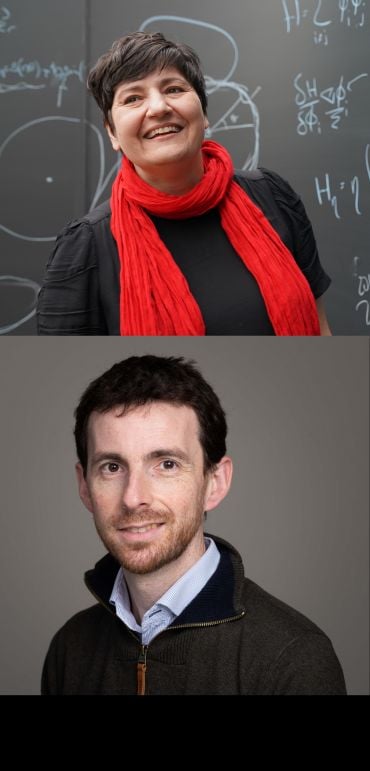
Major new project will harness AI to transform how zero-emission buildings are designed
The University of Oxford is to be a partner for the ZEBAI project; a major new initiative which aims to revolutionise the way Zero-Emission buildings are designed. The project, backed by 3.8 million Euros of funding from the European Commission Horizon Programme, will establish demonstrator projects in four countries to test innovative approaches to significantly reduce the carbon footprint of buildings.
 Top: Professor Sonia Antoranz Contera. Credit: Pamela Davis Kivelson. Below: Professor Antoine Jérusalem.
Top: Professor Sonia Antoranz Contera. Credit: Pamela Davis Kivelson. Below: Professor Antoine Jérusalem.Led by the Universidad Politécnica de Madrid, ZEBAI will address this by bringing together a consortium of 18 academic institutes from 7 European countries.
The Departments of Engineering Science and Physics at Oxford will focus on characterising and modelling how materials respond to temperature and mechanical forces, harnessing the power of AI to select locally-sourced building materials that are suited to specific environmental conditions. In particular, studying the specific properties of building materials and how they behave under the combined influence of different forces will reveal how they are likely to be affected by changes in temperature and loads or stresses.
The Departments’ analysis of the mechanical properties of materials used in buildings across Europe will be used to create a simulation that will be integrated with AI methodologies so that the resulting software can be incorporated into construction design platforms used by architects and engineers. ZEBAI software will include a large library of properties of materials based on their work and will be used to ensure that constructions meet net-zero targets.
Professors Sonia Antoranz Contera (Department of Physics) and Antoine Jérusalem (Engineering Science) will work with Lurtis Ltd to integrate AI modelling into the material selection process.
Professor Jérusalem says: ‘This is a very timely and exciting project where the work that Professor Contera and I are doing with engineering materials at multiple scales will feed into direct practice to maximise impact in the real world. ZEBAI is posed to push forward the frontier of energy-efficiency in future constructions with the state-of-the-art of mechanics and AI.’
The research done at Oxford will contribute to the project’s core goals of:
- optimising materials for different environments,
- streamlining the design process to make it more efficient and user-friendly, and
- ensuring both cost effectiveness and environmental objectives are achieved.
We are very excited to participate in this collaboration, which assembles such interesting companies (including Ukrainian partners), institutions, engineers, scientists and architects. We had this idea 4 years ago, and it is great to finally see it coming to life!
Professor Sonia Antoranz Contera, Department of Physics, University of Oxford.
ZEBAI aims to revolutionize zero-emission buildings design through a comprehensive methodology which will incorporate analyses, decision-making processes and holistic evaluations of energy performance, environmental impact, indoor environmental quality, and cost-effectiveness. This approach promises more efficient and user-friendly design processes and the potential to significantly reduce the carbon footprint of future buildings.
Furthermore, the project will develop a database of well-characterised materials and assess the differences between predicted and actual building performance. AI techniques will play a pivotal role in optimizing the selection of materials and systems across various aspects of building design. By integrating AI-assisted processes, the project aims to enhance the efficiency and user-friendliness of the design process, all while adhering to environmental quality and cost-effectiveness objectives.
The four representative demonstrators in the Ukraine, Spain, United Kingdom, and the Netherlands will serve as test cases, allowing the project team to assess the methodology’s performance across different climates, usages, and building patterns.
 Oxford researchers secure funding for world's first ovarian cancer prevention vaccine
Oxford researchers secure funding for world's first ovarian cancer prevention vaccine
 Oxford researchers record wettest month in 250 years
Oxford researchers record wettest month in 250 years
 US adults in worse health than British counterparts at midlife
US adults in worse health than British counterparts at midlife
 Oxford University launches new institute to tackle contemporary ethical issues
Oxford University launches new institute to tackle contemporary ethical issues
 Expert Comment: Three key pillars to tackle antimicrobial resistance effectively
Expert Comment: Three key pillars to tackle antimicrobial resistance effectively
 CO2 removal is essential, along with emissions cuts, to limit global warming - report
CO2 removal is essential, along with emissions cuts, to limit global warming - report
 Building a tomorrow better than yesterday?
Building a tomorrow better than yesterday? Building back better: Green COVID-19 recovery packages will boost economic growth and stop climate change
Building back better: Green COVID-19 recovery packages will boost economic growth and stop climate change